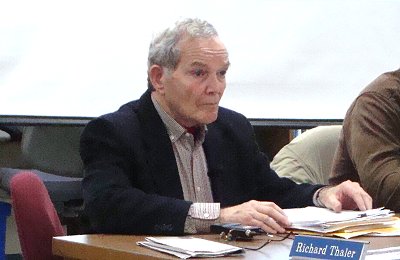- By Dan Veaner
- News
 Print
Print  When Governor Patterson announced Sunday that he would be delaying $750 million in payments to local governments alarm bells went off from Manhattan to Niagara Falls. Lansing Central School District Business Administrator Mary June King told Board Of Education (BOE) members that she received notice Monday that 10% of the aid that the State promised for December will be withheld. School board member Richard Thayler, an attorney and former prosecutor, said that Patterson's plan is illegal, and urged the board to fight back.
When Governor Patterson announced Sunday that he would be delaying $750 million in payments to local governments alarm bells went off from Manhattan to Niagara Falls. Lansing Central School District Business Administrator Mary June King told Board Of Education (BOE) members that she received notice Monday that 10% of the aid that the State promised for December will be withheld. School board member Richard Thayler, an attorney and former prosecutor, said that Patterson's plan is illegal, and urged the board to fight back."If, in fact, we do not have the money that the State committed to, they are looking to the taxpayers of the Lansing School District to make up the difference," Thayler said. "I think that is illegal. I don't think the Governor has the right or power to do so. Both the Assembly and the Senate have disagreed with the Governor."

Attorney and School Board Member Richard Thayler
Thayler asked the board for permission to write a letter to Patterson threatening to sue if the money isn't released as promised. After some discussion the board agreed that he would compose the letter for board approval before it is sent.
The numbers seem to change from minute to minute, but at this time Superintendent Stephen Grimm says that the district can expect approximately $24,500 in regular state aid payments delayed, and another $240,000 in STAR aid, making the total impact to Lansing $260,000.
"It is absolutely apparent that the taxpayers who qualify under the STAR exemption are not going to be able to get the money that it gives them," Thayler said. "Therefore the taxpayers of this school district are going to find themselves in deep financial trouble, not because they created it, but because the State didn't do what they were supposed to do and agreed to do."
"We are OK," King reported. "Our big bills come late in the fiscal year for us. We can hold onto things for a few months. The ten percent will put a hardship on us, and we are going to have to continue to prepare for the future and figure out ways to tighten our belt. But we can sustain our current momentum for at least a few months down the road."
Grimm says that the district will follow up on the threat of suing the State, if necessary, but not alone.
"What I have found is the most effective way to deal with such an issue is gathering together collectively with other schools, with the school board association, with the New york State Council of School Superintendents, and act as a large group," he says. "If it comes to legal action, that's what it will take. Acting as a single district would probably not be effective as working together. We could take the lead on that, and I think that's what Dick is saying. He's not afraid to be the leader and saying that we're not going to take this any more, and we're going to do whatever it takes to make it happen."
Grimm notes that the amount of money that Patterson is withholding is about the same as the amount of federal stimulus money that went to New York schools. He is additionally concerned about future budgets and the increasing difficulty of believing State officials when they commit money to school aid.
"What the state is doing, in essence, is just keeping it," he says. "We're going to spend the next five months developing a budget based on numbers that we get from the State. That is challenging enough, but then to change it when the plane is already off the ground is very difficult. We're hoping that the Legislature and the law will be able to rectify that."
Almost a million dollars is currently available in an unappropriated reserve that is supposed to be used to mitigate tax impact. For example, this fund helped reduce the tax burden this year to the tune of about $450,000. $150,000 equals about one percent, so the money accounted for 3% which helped the school board keep the tax rate at a zero percent rise. This money could be the safety net for this year, but eventually taxpayers will have to replenish it for future tax mitigation.
He says that the extra money from an AES Cayuga power plant agreement with the County last year was planned for that purpose so that homeowners wouldn't be burdened with that expense. But a reevaluation of that property will certainly mean less tax money from the facility, piling on to the negative effect Patterson's plan will have on the district.
Still Grimm has said his goal is to put another zero percent tax-rate-rise budget before the voters this May.
"I think you have to have that goal," he says. "The initial goal is how can we do this without it costing any more. The realistic piece of that is that we know that may not be possible.
Grimm notes that conservative planning and careful spending meant that more that 3% of last year's budget was not spent. That money then goes into reserves to fortify the district against just such a crisis. But will it be enough over the long haul? School officials fear it will not.
----
v5i49



